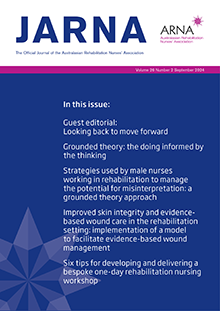Aims To evaluate the impact of a model for evidence-based wound management in a tertiary geriatric rehabilitation setting
Design A longitudinal, pre-post design
Methods The Champions for Skin Integrity (CSI) model uses multiple evidence-based strategies to facilitate transfer of knowledge into practice. Data were collected before, and ten months after introduction of the model in a tertiary geriatric rehabilitation setting. Data on wound management and skin integrity were obtained from all consenting inpatients via a prevalence survey and medical record review in geriatric rehabilitation wards of a metropolitan tertiary hospital (n=64 pre; n=42 post). Staff interviews, focus groups and a survey were also undertaken (n=88 pre; n=63 post). Descriptive statistics were calculated for all variables. Where relevant, Chi square for independence or t-tests were used to identify differences between pre/post data.
Results There was significantly increased implementation of evidence-based wound management and prevention strategies following the implementation phase, in comparison to pre-implementation data. This included increased documented skin integrity risk assessments (39% pre vs 93% post, p<0.001), increased wound prevention strategies (22% pre, to 43% post, p=0.05), and documented wound assessments (31% pre vs 86% post, p<0.001). Associated with these changes was a significant decrease in severity of skin tears (p=0.02) and lower prevalence of pressure injuries (19% pre, to 14.6% post) and skin tears (25% pre, to 17% post, ns).
Conclusion This multifaceted implementation model was successful in facilitating uptake of evidence-based wound management and prevention strategies in a hospital rehabilitation setting, leading to improved clinical outcomes.





